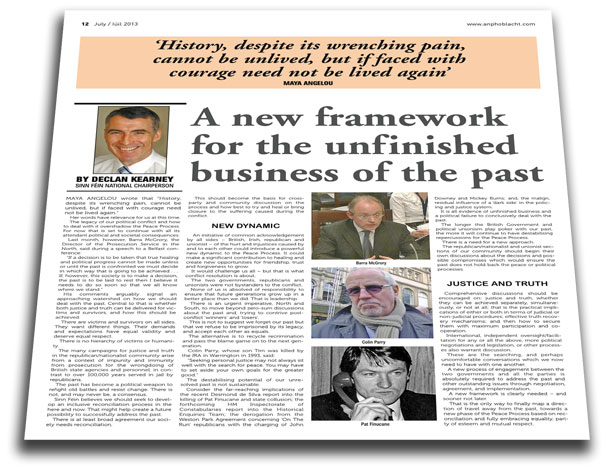27 June 2013
A new framework for the unfinished business of the past – Declan Kearney

‘History, despite its wrenching pain, cannot be unlived, but if faced with courage need not be lived again’ – Maya Angelou
MAYA ANGELOU wrote that “History, despite its wrenching pain, cannot be unlived, but if faced with courage need not be lived again.”
Her words have relevance for us at this time.
The legacy of our political conflict and how to deal with it overshadow the Peace Process. For now that is set to continue with all its attendant political and societal consequences.
Last month, however, Barra McGrory, the Director of the Prosecution Service in the North, said during a speech to a Belfast conference:
“If a decision is to be taken that true healing and political progress cannot be made unless or until the past is confronted we must decide in which way that is going to be achieved . . . If, however, this society is to make a decision, the past is to be laid to rest then I believe it needs to do so soon so that we all know where we stand.”
His comments arguably signal an approaching watershed on how we should deal with the past. Central to that is whether both justice and truth can be delivered for victims and survivors, and how this should be achieved.
There are victims and survivors on all sides. They want different things. Their demands and expectations have equal validity and deserve equal respect.
There is no hierarchy of victims or humanity.
The many campaigns for justice and truth in the republican/nationalist community arise from a context of impunity and immunity from prosecution for the wrongdoing of British state agencies and personnel, in contrast to over 100,000 years served in jail by republicans.
The past has become a political weapon to refight old battles and resist change. There is not, and may never be, a consensus.
Sinn Féin believes we should seek to develop an inclusive reconciliation process in the here and now. That might help create a future possibility to successfully address the past.
There is at least broad agreement our society needs reconciliation.
This should become the basis for cross-party and community discussion on the process and how best to try and heal or bring closure to the suffering caused during the conflict.
NEW DYNAMIC
An initiative of common acknowledgement by all sides – British, Irish, republican and unionist – of the hurt and injustices caused by and to each other could introduce a powerful new dynamic to the Peace Process. It could make a significant contribution to healing and create new opportunities for friendship, trust and forgiveness to grow.
It would challenge us all – but that is what conflict resolution is about.
The two governments, republicans and unionists were not bystanders to the conflict.
None of us is absolved of responsibility to ensure that future generations grow up in a better place than we did. That is leadership.
There is an urgent imperative, North and South, to move beyond zero-sum discussions about the past and, trying to contrive post-conflict ‘winners’ and ‘losers’.
This is not to suggest we forget our past but that we refuse to be imprisoned by its legacy, and accept each other as equals.
The alternative is to recycle recrimination and pass the blame game on to the next generation.
Colin Parry, whose son Tim was killed by the IRA in Warrington in 1993, said:
“Seeking personal justice may not always sit well with the search for peace. You may have to set aside your own goals for the greater good.”
The destabilising potential of our unresolved past is not sustainable.
Consider the far-reaching implications of the recent Desmond de Silva report into the killing of Pat Finucane and state collusion; the forthcoming HM Inspectorate of Constabularies report into the Historical Enquiries Team; the derogation from the Weston Park Agreement concerning ‘On The Run’ republicans with the charging of John Downey and Mickey Burns; and, the malign, residual influence of a ‘dark side’ in the policing and justice system.
It is all evidence of unfinished business and a political failure to conclusively deal with the past.
The longer the British Government and political unionism play poker with our past, the more it will continue to have destabilising repercussions for the Peace Process.
There is a need for a new approach.
The republican/nationalist and unionist sections of our community should begin their own discussions about the decisions and possible compromises which would ensure the past does not hold back the peace or political processes.
JUSTICE AND TRUTH
Comprehensive discussions should be encouraged on: justice and truth, whether they can be achieved separately, simultaneously, or not at all; that is the practical implications of either or both in terms of judicial or non-judicial procedures; effective truth recovery mechanisms; and then how to secure them with maximum participation and co-operation.
International, independent oversight/facilitation for any or all the above, more political negotiations and legislation, or other processes also warrant discussion.
These are the searching, and perhaps uncomfortable conversations which we now need to have with one another.
A new process of engagement between the two governments and all the parties is absolutely required to address the past and other outstanding issues through negotiation, agreement, and implementation.
A new framework is clearly needed – and sooner not later.
That is the only way to finally map a direction of travel away from the past, towards a new phase of the Peace Process based on reconciliation and fully embracing equality, parity of esteem and mutual respect.
Follow us on Facebook
An Phoblacht on Twitter
Uncomfortable Conversations

An initiative for dialogue
for reconciliation
— — — — — — —
Contributions from key figures in the churches, academia and wider civic society as well as senior republican figures





